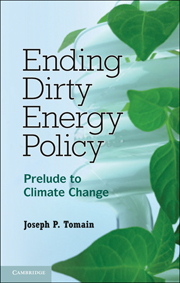Book contents
- Frontmatter
- Contents
- Preface
- Introduction
- 1 A Regulatory History of Dirty Energy Law and Policy
- 2 Protectionist Assumptions
- 3 The Next Generation Is Now
- 4 Consensus Energy Policy
- 5 Fossil Fuel Future
- 6 Electricity Future
- 7 Venture Regulation
- 8 Smart Energy Politics
- 9 Conclusion – Strategies for the Energy Future
- Notes
- Index
6 - Electricity Future
Published online by Cambridge University Press: 05 June 2012
- Frontmatter
- Contents
- Preface
- Introduction
- 1 A Regulatory History of Dirty Energy Law and Policy
- 2 Protectionist Assumptions
- 3 The Next Generation Is Now
- 4 Consensus Energy Policy
- 5 Fossil Fuel Future
- 6 Electricity Future
- 7 Venture Regulation
- 8 Smart Energy Politics
- 9 Conclusion – Strategies for the Energy Future
- Notes
- Index
Summary
Energy business-as-usual is not a viable option for the United States.
CNA Military Advisory BoardIntroduction
Moving away from energy business as usual has a direct and significant impact on our electricity future, particularly as electricity plays a larger role in transportation. To get there, however, the oil and electricity sectors will require different regulatory regimes. In the past, the two sectors were regulated significantly differently. Except in times of crisis, the oil industry was largely immune from price and allocation regulations. Instead, the oil industry was free to set its prices and, except for the beginning of the twentieth century, was treated as a competitive non-monopolistic industry. To the extent that government intervened in the oil industry, it did so through subsidies and financial supports, some of which were direct, some of which were indirect, and some, such as military support, were hidden. Such financial support subsidized, and therefore underpriced, the cost of gasoline at the pump. By contrast, the electricity industry was heavily regulated as a natural monopoly, which had the intended effect of supporting its expansion and capital development.
As our energy future evolves, the case can easily be made for the removal of government price supports and subsidies to the oil industry. The case can further be made for the necessity of pricing carbon, which will affect the price of oil, bringing it closer to its true cost.
- Type
- Chapter
- Information
- Ending Dirty Energy PolicyPrelude to Climate Change, pp. 154 - 183Publisher: Cambridge University PressPrint publication year: 2011



